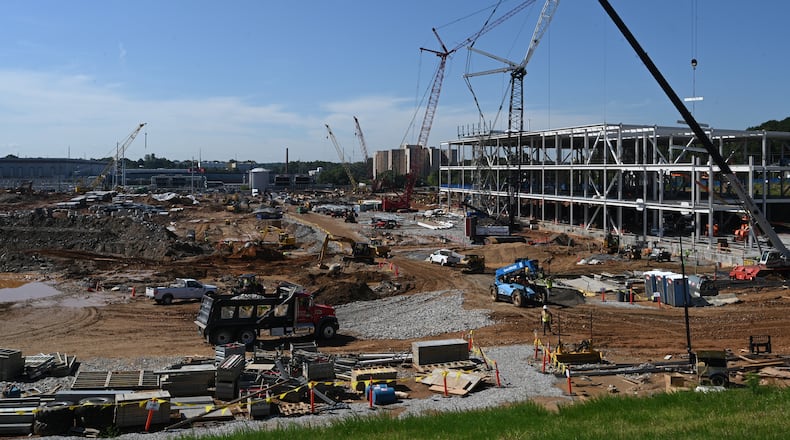A proposed $45 million tax break for a data center already under construction near the Beltline reignited tensions between the city of Atlanta and a Fulton County authority that critics say is too generous with incentives.
The Development Authority of Fulton County (DAFC) on April 25 punted on a decision to grant the tax break to developer Quality Technology Services after facing a firestorm of resident complaints and admonishments from city leaders ahead of last month’s vote. Instead, DAFC said it would hold meetings with neighbors and QTS with plans to reschedule a vote within two weeks.
But that deadline has already passed, and neighborhood groups said they’ve heard nothing from DAFC or the the company.
Kansas-based QTS sought the incentive for a 50-acre expansion to its existing Atlanta data center campus near West Marietta Street. But the item was pulled from DAFC’s meeting agenda after the board received more than 100 written comments, nearly all opposed.
“No developer needs incentives to build on the equivalent of beachfront property,” resident Robyn Turner wrote.
When asked by The Atlanta Journal-Constitution, neither QTS nor DAFC provided a date for when the tax break request would be reconsidered.
“We hope to have more information on this item soon,” DAFC Chairman Michel “Marty” Turpeau IV said.
Development authorities often avoid much scrutiny, but they have outsize influence in recruiting jobs and investment. Their main tools are lucrative property tax abatements that reduce developers’ city, county and school tax bills. But critics contend DAFC often grants incentives to projects that would be built without the taxpayer support.
The DAFC and city have long been at odds. DAFC and Invest Atlanta, the city’s economic development arm, are both able to offer incentives to companies to locate or expand within the city’s limits.
For years, Atlanta has tried to stop DAFC from stepping on Invest Atlanta’s turf and approving tax breaks Invest Atlanta would likely reject.
A 2021 AJC review of DAFC tax breaks over a three-year period found the agency awarded preliminary or final approval to some $328 million in tax breaks, often in hot neighborhoods within the city of Atlanta such as Midtown, Buckhead and along the Beltline. Many of the projects were for luxury apartments, warehouses or office buildings with little public benefit in return.
In the case of QTS, the heads of both the Beltline and Invest Atlanta urged DAFC to reject the proposal.
Atlanta Councilman Matt Westmoreland called incentives for the QTS proposal egregious.
“Usually (companies) would say, ‘We’re not going to be able to build this if we don’t get the abatement,’ which I’ve always questioned,” Westmoreland said. “But in this instance, it’s literally under construction.”
DAFC said the board would meet with QTS and residents before the tax break is reconsidered. Arthur Toal, who leads the Howell Station Neighborhood Association and lives across from the expansion site, told the AJC that community meeting has yet to be scheduled and QTS representatives did not attend his organization’s quarterly meeting last week despite being invited.
“We haven’t heard anything from them,” Toal said. “I’m not surprised, but I am disappointed.”
Credit: arvin.temkar@ajc.com
Credit: arvin.temkar@ajc.com
In a written statement, QTS said the company “is engaging with key community stakeholders and continuing education and outreach efforts.”
Play ‘against each other’
There are many cities in Georgia in which a municipal and county development authority each have jurisdiction. But nowhere has it led to as much angst as Atlanta, where city leaders have tried to have state law changed to keep DAFC out of its jurisdiction, to no avail.
Westmoreland said the issue boiled over again in 2020 following DAFC-approval of tax breaks for high-end housing developments along the Beltline and other market-rate projects. The council unanimously approved a resolution to ask DAFC to stay out of Atlanta.
DAFC in recent years has given away far more in incentives than Invest Atlanta, which has been instructed by the city council to focus its resources on stimulating middle-wage jobs, small businesses, startups, affordable housing and underinvested neighborhoods.
Georgia law allows every county and city to create a development authority. In populous counties like Fulton and DeKalb, that’s led to more than a dozen authorities, many with overlapping jurisdictions.
In testimony last year before a Georgia Senate committee studying development authorities, several officials from metro governments said authorities should not be allowed to compete with one another, especially when the agencies earn fees to fund operations by striking deals.
“The developers know they can play the two off against each other, and they do,” Julian Bene, a former Invest Atlanta board member, told the committee.
Swift public pushback
QTS, which is owned by investment giant Blackstone, has expanded its Jefferson Street site over the past 15 years.
The two existing data centers on the campus span roughly 1.5 million square feet. The $1.3 billion expansion — for which QTS is pursuing the tax break — would add roughly 755,000 square feet of data center space.
Credit: HYOSUB SHIN / AJC
Credit: HYOSUB SHIN / AJC
Several residents said granting a tax break for a project that would happen anyway only hurts local governments’ ability to provide services or fund things like affordable housing.
Eric Harrison was chair of Neighborhood Planning Unit K when QTS sought rezoning of the property. He told DAFC that company representatives told the planning board they wouldn’t seek tax breaks, adding he believes the company wasn’t being truthful.
Harrison said a tax break would “distort the free market” and “leave our students less able to compete in the future for jobs at entities like QTS.”
DAFC’s next regularly scheduled meeting is May 23.
About the Author
Keep Reading
The Latest
Featured





